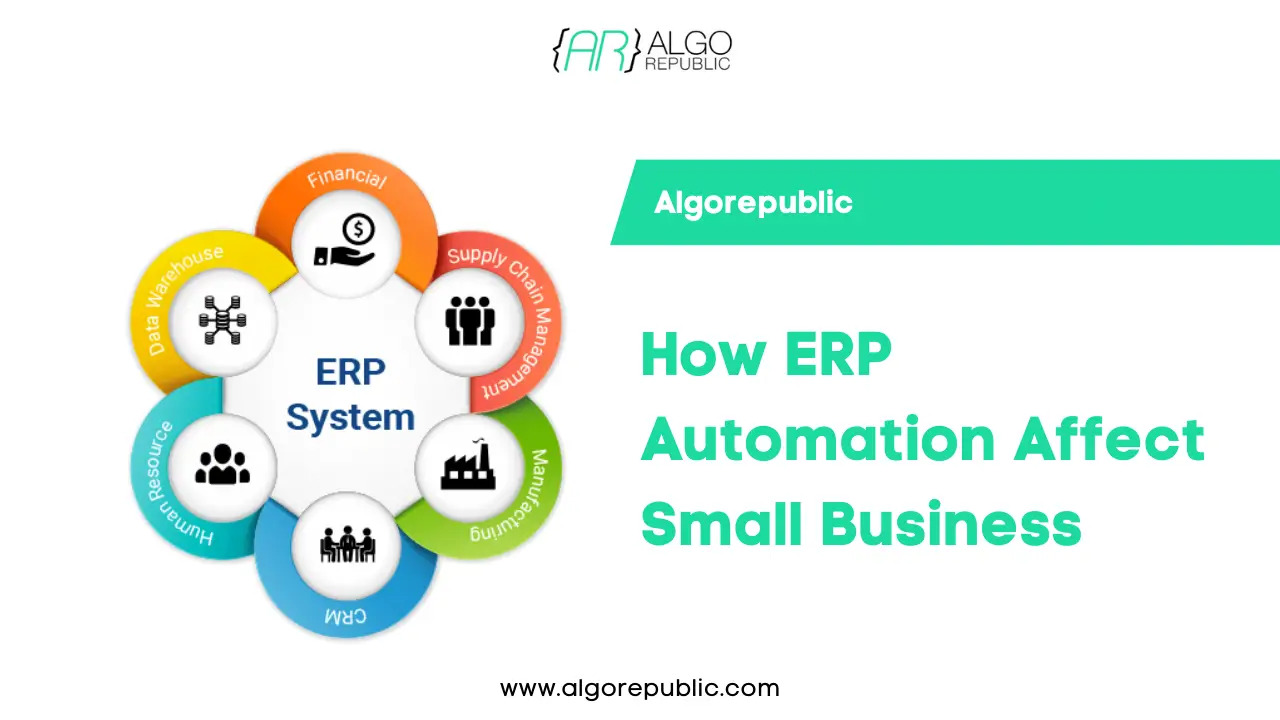Table of Contents
Managing operations and staying competitive is a major struggle for small businesses especially in today’s fast-paced businesses world. However, there exists the Enterprise Resource Planning (ERP) system as an effective solution that streamlines business processes, boosts decision-making capability and increases productivity levels.
Furthermore, ERP automation enables small businesses to optimize operations by reducing manual tasks leading them towards sustainable growth. This blog highlights how ERP automation systems affect small enterprise activities while providing benefits for such organizations as well
ERP Automations – Simplifying Procedures and Workflows
Small businesses can greatly benefit from ERP automation through the optimization of processes and workflows. With an ERP system in place, data is centralized into a single platform that enables small businesses to effectively manage multiple business functions including finances, inventory management, human resources and customer relationship management.
Through automated tasks such as invoice processing, data entry & inventory management it reduces manual errors thereby cutting down on process time consequently improving efficiency in overall operations.
Improving data precision and reliability
Small businesses benefit from using automated ERP systems, which eliminate potential errors that may arise due to manual data entry and processing.
Such inaccuracies can cause inconsistencies in business records, but with automated business processes, this risk is considerably reduced. Automated functions such as validation of capture and synchronization across different modules ensure the accuracy of information provided to decision-makers leading to informed decisions made on up-to-date reliable data without requiring any manual input which reduces duplication or error occurrence within recorded business dataset.
Enhancing Decision-Making and Visibility
In order for small businesses to thrive, making effective decisions is essential. ERP automation serves as an important factor in granting access to real-time visibility and insights into business operations.
By automating data collection processes, analysis and reporting, ERP systems allow small businesses to take an all-encompassing view of their performance by identifying trends that will enable them make relevant decisions based on actual information at hand; this could be monitoring sales trends or inventory levels as well as analyzing customer behavior among other things.
With such complete info provided through ERP automation tools, it empowers SMEs (Small And Medium Enterprises) with prompt response capabilities towards changing market dynamics while also being able capitalize quickly on emerging opportunities when they arise without delay!
Increasing productivity and improving efficiency
Manual tasks consume significant time and resources that detract from essential business operations and important tasks. Through ERP automation, staff can be freed of irrelevant, resource-intensive duties to focus on high-impact initiatives for enabling business growth and innovation.
The streamlining of operations through automating routine tasks such as financial reporting, order processing, and inventory management increases productivity for small businesses while reducing their resource usage to accomplish more with less effort.
Improving Customers Experience
Small businesses competing in today’s digital age are placing significant importance on customer experience as a key factor to stand out among crowds. ERP automation has proven helpful for such businesses, allowing them to provide exceptional customer experiences by streamlining order processing and enhancing their inventory management systems while giving timely updates that ensure accuracy at all times.
By utilizing automated processes concerning communications with customers, fulfilling orders quickly and effortlessly alongside support services, small businesses can elevate the satisfaction of every client they serve– building loyalty along the way whilst also standing apart from competitors present within the industry sector.
ERP Automation Examples
ERP automation encompasses a wide range of functions that can significantly impact various aspects of small business operations. Here are some examples of how ERP automation can be implemented:
1. Financial Management:
Automated Invoicing: Generate and send invoices automatically, track payments, and manage accounts receivable and payable with minimal manual intervention.
Expense Management: Automatically categorize expenses, process reimbursements, and integrate with bank accounts for seamless financial management.
Budgeting and Forecasting: Use real-time data to create accurate financial forecasts and budgets, adjusting them dynamically based on actual performance.
2. Inventory Management:
Stock Monitoring: Automatically update inventory levels in real-time, track stock movements, and generate alerts for reordering when levels are low.
Supplier Management: Automate purchase orders based on predefined criteria, ensuring timely replenishment of stock without manual tracking.
Warehouse Management: Optimize warehouse operations with automated picking, packing, and shipping processes.
3. Human Resources:
Payroll Automation: Automate payroll processing, tax calculations, and employee benefits management, ensuring accurate and timely salary disbursements.
Recruitment and Onboarding: Streamline recruitment processes with automated job postings, candidate tracking, and onboarding workflows.
Performance Management: Automate performance reviews, goal setting, and employee feedback processes to enhance workforce productivity.
4. Customer Relationship Management (CRM):
Lead Management: Automatically capture and track leads, nurture them through automated email campaigns, and assign them to sales representatives based on predefined rules.
Sales Automation: Streamline the sales process with automated quotes, order processing, and contract management.
Customer Support: Implement automated ticketing systems, chatbots, and self-service portals to enhance customer support and satisfaction.
Integration with Other Systems
ERP systems can be integrated with other business applications to further enhance automation and streamline operations:
1. E-commerce Integration:
Order Management: Integrate ERP with e-commerce platforms to automate order processing, inventory updates, and customer notifications.
Payment Processing: Automate payment capture and reconciliation by integrating ERP with payment gateways.
2. Marketing Automation:
Campaign Management: Integrate ERP with marketing automation tools to streamline campaign management, track customer interactions, and measure campaign effectiveness.
Personalized Marketing: Use ERP data to create personalized marketing campaigns based on customer behavior and preferences.
ERP Automation Trends and Future Outlook
1. AI and Machine Learning:
Predictive Analytics: Use AI-driven predictive analytics to forecast demand, optimize inventory levels, and improve decision-making.
Process Automation: Implement machine learning algorithms to automate complex processes, such as fraud detection and risk management.
2. Internet of Things (IoT):
Real-Time Monitoring: Leverage IoT devices to collect real-time data from production lines, warehouses, and delivery vehicles, integrating it with ERP systems for improved operational efficiency.
Predictive Maintenance: Use IoT data to predict equipment failures and schedule maintenance proactively, reducing downtime and repair costs.
3. Cloud-Based ERP Solutions:
Scalability: Cloud-based ERP solutions offer scalability, allowing small businesses to expand their operations without significant upfront investments in infrastructure.
Accessibility: Provide remote access to ERP systems, enabling employees to work from anywhere and ensuring business continuity.
4. Mobile ERP:
On-the-Go Access: Mobile ERP applications allow employees to access critical business information and perform tasks on-the-go, increasing productivity and responsiveness
Adopting the Capabilities of ERP Automation
Small businesses can utilize ERP automation solutions as a potent means to optimize operations, enhance efficiency, and enable growth. With the ability to simplify tasks, increase data precision and provide immediate insights into performance metrics, these systems enable informed decision-making while bolstering productivity levels for better customer outcomes.
As digital transformation continues among small business forums today amidst competitive landscapes–it is likely that automated ERPs will become even more important in facilitating success and longevity of company initiatives moving forward toward possibilities of innovation; be sure not miss out by embracing this advantageous technology for your own sake!
Reference: Small ERP Automation Systems



